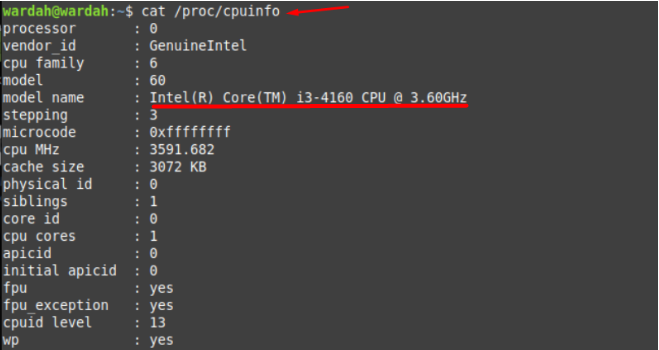

Model name : Intel(R) Core(TM)2 Quad CPU Q9550 2. Code: Select all piraspberrypi: cat /proc/cpuinfo processor : 0 model name : ARMv7 Processor rev 4 (v7l) BogoMIPS : 38. Open your terminal and use less or cat to display the contents of /proc/cpuinfo: less /proc/cpuinfo The command will print each logical CPU with an identifying number. It will work no matter what Linux distribution you are using. Whereas /proc/cpuinfo has an information regarding the core id. Identifying the type of processor using the proc/cpuinfo file does not require installing any additional programs. Some processors may come under the category of hyper thread processors where the operating system considers the number of cores as double. When I issue below command, it shows only one core (not 4 cores): what could be reason! cat /proc/cpuinfo grep ‘processor’ processor: 0.
#Cat proc cpuinfo Pc#
Rc-svcdir 1.0M 92K 932K 9% /lib64/rc/init.I have just bought new PC (Intel mother board "Intel DP43TF ATX" and Processor "Intel Core 2 Quad Q9550"). Ive run cat/proc/cpuinfo and got the following: processor : 0 vendorid : GenuineIntel cpu family : 6 model. dmidecode Command There are a number of ways you can get information about the processor on your Linux system.
#Cat proc cpuinfo how to#
This page shows how to use /proc/cpuinfo file and lscpu command to display number of processors on Linux. If its purely personal curiosity, then checking the bootloader/early kernel output on startup, or grovelling about in the Device Tree, might also reveal something you can piece together.
#Cat proc cpuinfo portable#
Then you faced with something like this : You can use this for more information : Share Improve this answer Follow answered at 8:30 milad salimi 175 2 8 Add a comment 1 Use the uname -m or arch command from the terminal. Either way, theres not really a robust, portable solution, so you may want to rethink if your code really needs to know the CPU clock. cat / proc / cpuinfo The output tells us three things about this Raspberry Pi: It has a processor based on the ARM architecture (rather than Intel as in Windows PCs and Macs), the processor uses the ARMv6 instruction set, and that the processor is the BCM2708, which we know is a processor from Broadcom. For example, the /proc/uptime file gives you. Again, I'm not stating that other files don't have value, but these are the ones I've found that have the most value to me. And the most valuable of those are cpuinfo and meminfo. You can view /proc/cpuinfo with the help of cat command or grep command / egrep command. You can just use this : more /proc/cpuinfo in your command line. The /proc files I find most valuable, especially for inherited system discovery, are: cmdline. Mounted Disk Space / Size Most commonly using df -h.įilesystem Size Used Avail Use% Mounted on Am I reading the information correctly Thanks. Get CPU info with lscpu command lscpu command output explanation Other commands to check CPU information in Linux 1. The /proc/cpuinfo file stores CPU and system architecture dependent items, for each supported architecture.
#Cat proc cpuinfo free#
This is all contained in /proc/cpuinfo which can be viewed withĬheck Number of Cores egrep '^processor' /proc/cpuinfo Check Processor for 64bit grep ' lm ' /proc/cpuinfo Check for Virtualization egrep '^flags.*(vmx|svm)' /proc/cpuinfo Memory Information Kernel Memory Details cat /proc/meminfo System Memory Details free -m Swap Information cat /proc/swapsAlso /etc/fstab Disk Information Disks List Use one of the following This is considered fundamental knowledge for any Linux System Administrator cat /proc/cpuinfo (Image credit: Tom's Hardware) This command will produce a lot of text, typically it. This covers basic hardware and core system commands. Use the cat command to display the data held in /proc/cpuinfo. cat /proc/cpuinfo processor : 0 vendorid : GenuineIntel cpu family : 6 model : 142 model name : Intel (R) Core (TM) i5-7360U CPU 2.30GHz stepping : 9 cpu MHz : 2303.

Here are a number of example commands to check various points of a Linux system, disk, swap, memory, CPU, network and other system information.


 0 kommentar(er)
0 kommentar(er)
